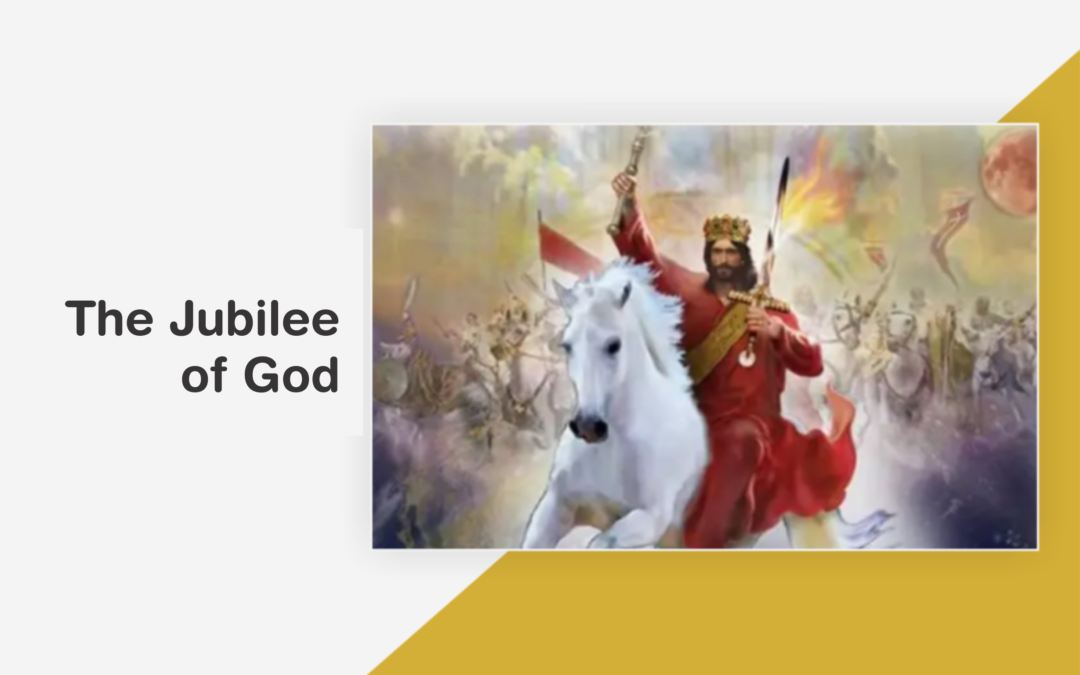Anchor Scripture: Leviticus 25: 8-10
In the introductory post, we established three critical, but foundational knowledge as follows:
1. God is a God of order, plan, and purpose. He does nothing haphazardly
2. God is a God of righteousness, judgment, and loving kindness
3. The Old Testament (OT) was a shadow of the things to come
Against this backdrop, the following installment will explore the Jubilee of the OT and how it pertains to end time things – the eschatological events.
Jubilee is a powerful concept of the OT but has barely received the attention it deserves by today’s Bible teachers or is simply relegated to the background. Its deepest meaning as established in a previous installment in the Jubilee of God series, is evinced in the restoration of all things by God at the eschatology, i.e., the emancipation of all people from the slavery of sin, and hence, the establishment of true liberty for the children of God – a total delivery of creation from the bondage of corruption, which it was subjected to on account of the fall of man.
Jubilee in the OT was a provision of the law to be practiced by the nation of Israel, whereas the jubilee of God as emphasized in this CW series, is the enforcement of the jubilee law code as would be fulfilled by God at the eschatology. On the other hand, the eschatological church is the Israel of God, i.e., the community of faith as was desired by God in the OT but was hindered because of Israel’s inability to live up to the requirements of the law of Moses. Jesus’ crucifixion and resurrection became the inaugural act in the “remaking” of the whole creation and perfected in the NT church, which the law could not do with the church in the wilderness. And so, what the law could not do in that it was weak through the flesh, the Son of God perfects in his body (the church) through grace.
The Israel of God is thus the NT church (Gal. 6:16). The Jubilee of God and the eschatological Church, however, are two separate concepts. Jubilee is a law code, while the Church is the family of God, both in the Old and New Testaments. Hence, the execution of the law code by God at the eschatology is not what produces the church. The church was already birthed at the cross. God executes the jubilee law code to qualify the rest of the world to join his eschatological family, but not based on the new covenant (Eze. 16:61). The two parts combine as the new family of God but deriving from two separate means: one part is through the blood of the cross, while the other is through the provisions of the Jubilee law code. Like the Levitical priesthood was joined with the twelve tribes to portray the church in the wilderness, so will the blood-redeemed new covenant church be joined with the nations, the rest of the world to be reconciled to God through the jubilee law code, to portray the eschatological church.
Our anchor scripture for this installment in the series (Lev. 25:8-10), shows the requirements of the jubilee law code as follows:
Vs 8: And thou shalt number seven Sabbaths of years unto thee, seven times seven years; and the space of the seven Sabbaths of years shall be unto thee forty and nine years.
Vs 9: Then shalt thou cause the trumpet of the jubilee to sound on the tenth day of the seventh month, in the Day of Atonement shall ye make the trumpet sound throughout all your land.
Vs 10: And ye shall hallow the fiftieth year and proclaim liberty throughout all the land unto all the inhabitants thereof: it shall be a jubilee unto you; and ye shall return every man unto his possession, and ye shall return every man unto his family.
With regards to the NT, our anchor text is found in the events of the crucifixion, the burial, and the resurrection of Jesus Christ. After he appeared to his disciples and ascended to heaven, the sounding of the trumpet of Jubilee (Lev. 25:9) was marked by their Upper Room experience – the Pentecost. Note that this occurred precisely on the fiftieth day after his resurrection, as required by the jubilee code of Leviticus 25. Isn’t it amazing how God orchestrated the events of the Bible?! Effectively, though Jubilee was not specifically mentioned in the Pentecost enactment, it is unmistakably implicated throughout the prints of the New Testament (Luke 4:16-21, 1 Thess. 5:4, Matt. 18:22).
The designation and proclamation of jubilee every fifty years, the completion and enactment of Pentecost after 50 days of the wait at the Upper Room, shows that God does nothing except by design, and that any principle He mandates for His people, He constrains himself in practice to obey. We must then underscore these facts: (1) the activation of the jubilee law code for the emancipation demonstrates God’s purpose to redeem all things to Himself, and (2) God is highly principled, and will not require man to abide by a law himself is not willing to obey. This is why the Bible tells us that He watches over His words to fulfill it (Jer. 1:12). God complies, in a nutshell, with his own order of principles. Previous post.
Have questions or comments
Please use the form to the side

